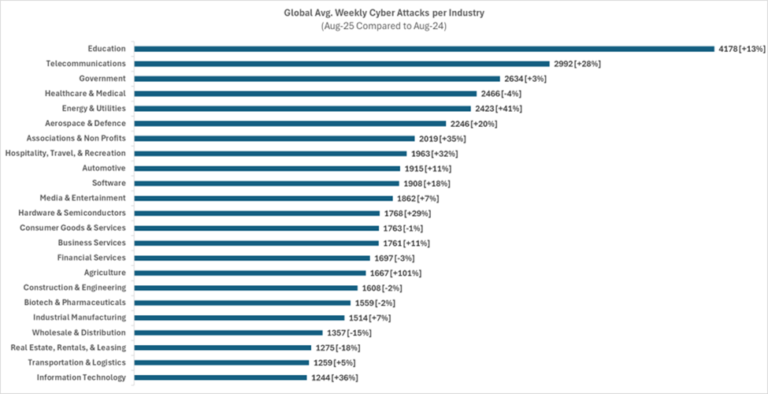A new report from Check Point Research, the threat intelligence arm of Check Point Software Technologies, reveals that the education, telecommunications and agriculture sectors were the most targeted by cyberattacks in August 2025. According to the report, these sectors were targeted because they are essential to daily life and any disruption creates maximum leverage for attackers.
The Global Threat Intelligence Report for August 2025 indicates that organizations worldwide faced an average of 1,994 cyberattacks per week. While this represents a slight decline from July, it marks a 10% increase year-over-year, signaling a historically high level of cyber threats.
Africa emerged as the most heavily attacked region, with an average of 3,239 weekly attacks per organization. Following closely were the Asia-Pacific (2,877 weekly) and Latin America (2,865 weekly) regions, with Europe and North America also experiencing significant increases. North America, in particular, saw a 20% year-over-year spike in attacks, largely driven by a surge in ransomware.
In Africa, the report highlighted that Angola, Kenya, Nigeria, and South Africa were particularly affected. Angola suffered the most attacks with 3,648 per week, followed by Kenya (3,448), Nigeria (3,394), and South Africa (2,148).
Lorna Hardie, Regional Director for Africa at Check Point Software Technologies, expressed alarm at the data. She stressed the need for the continent to “raise cybersecurity awareness and implement the necessary measures to improve cyber resilience across the board.”
“The education sector continues to be the most targeted globally, enduring an average of 4,178 weekly attacks. The report attributes this to the sector’s ongoing digitization and its typically underfunded cybersecurity defenses,” she said.
Meanwhile, the telecommunications industry faced 2,992 weekly attacks, a 28% year-over-year increase. This highlights the sector’s dual role as critical infrastructure and a gateway for attackers to reach other targets.
The most dramatic increase was seen in the agriculture sector, which saw a 101% year-over-year growth in attacks, reaching 1,667 per week. This rise reflects attackers’ growing interest in exploiting global supply chains and food security, with the industry’s increasing reliance on technology, IoT sensors, and drones making it an attractive target.
Ransomware remains a significant threat, with 531 publicly reported incidents in August, a 14% increase year-over-year. North America accounted for 57% of these cases, with the U.S. alone responsible for 54% of all reported ransomware incidents worldwide.
Leading ransomware groups included Qilin, Akira, and Inc. Ransom. The report notes that Inc. Ransom has specifically targeted the critical healthcare and education sectors.
Omer Dembinsky, Data Research Manager at Check Point Research, emphasized the need for a “prevention-first, AI-powered strategy.” He stated, “The only sustainable path forward is a prevention-first, AI-powered strategy. Organizations must move beyond detection to real-time prevention to safeguard critical services against relentless cyber adversaries.”


